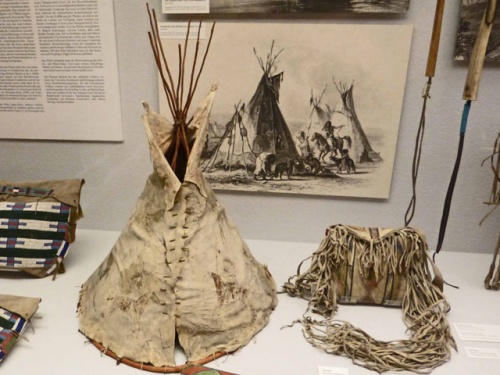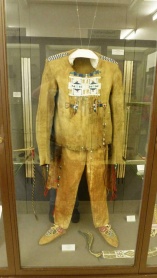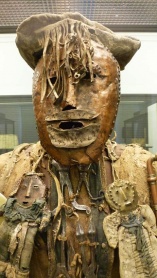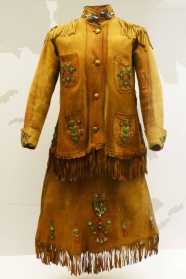Difference between revisions of "Cultures and leather"
(Created page with "<p align=center> 300px </p> Leather plays an important role in the various cultural circles and epochs. Particularly in time-speeches, wh...") |
|||
| Line 8: | Line 8: | ||
==The leather of the Eskimos== | ==The leather of the Eskimos== | ||
| − | Because of the inhospitable climatic conditions in the polar region, survival without leather was impossible. Words like "kayak", "parka" or "anorak" come from this culture. In the extreme cold, leather was extracted from the available animals. Polar bears, whales, [[Sealskin leather|seals]], [[Sealskin leather | + | Because of the inhospitable climatic conditions in the polar region, survival without leather was impossible. Words like "kayak", "parka" or "anorak" come from this culture. In the extreme cold, leather was extracted from the available animals. Polar bears, whales, [[Sealskin leather|seals]], [[Sealskin leather#Walrus leather|walrus]], sea otters, [[Reindeer leather|caribou]], muskoches and [[fish leather|fish]]. In the country [[Sheepskin - Lambskin|sheep]], [[Goatskin|goats]] and [[Deerskin|deer]] were added. |
| Line 15: | Line 15: | ||
</p> | </p> | ||
<p align=center> | <p align=center> | ||
| − | ''Eskimos even covered theirs [[Marine & Boat leather|boats]] with leather ([[ | + | ''Eskimos even covered theirs [[Marine & Boat leather|boats]] with leather ([[Leather museum|DLM - German Leather Museum in Offenbach]]).''<br></p> |
<p> </p> | <p> </p> | ||
| Line 23: | Line 23: | ||
</p> | </p> | ||
<p align=center> | <p align=center> | ||
| − | ''Inuit in [[Sealskin leather|sealskin clothing]]. - Raincoats made of [[Sealskin leather|seal intestines skin]] ([[ | + | ''Inuit in [[Sealskin leather|sealskin clothing]]. - Raincoats made of [[Sealskin leather|seal intestines skin]] ([[Leather museum|DLM - German Leather Museum in Offenbach]]).''<br></p> |
<p> </p> | <p> </p> | ||
| Line 31: | Line 31: | ||
</p> | </p> | ||
<p align=center> | <p align=center> | ||
| − | ''Reversed [[Sealskin leather|sealskin]] as buoy for the whalebone. - [[Leather clothing|Leather jacket]] the Eskimos from bird bellows ([[ | + | ''Reversed [[Sealskin leather|sealskin]] as buoy for the whalebone. - [[Leather clothing|Leather jacket]] the Eskimos from bird bellows ([[Leather museum|DLM - German Leather Museum in Offenbach]]).''<br></p> |
<p> </p> | <p> </p> | ||
| Line 44: | Line 44: | ||
</p> | </p> | ||
<p align=center> | <p align=center> | ||
| − | ''Model of an [[Leather tents & Tent walls| | + | ''Model of an [[Leather tents & Tent walls|Indian tent]] made of leather ([[Leather museum|DLM - German Leather Museum in Offenbach]]).'' |
</p> | </p> | ||
| Line 54: | Line 54: | ||
</p> | </p> | ||
<p align=center> | <p align=center> | ||
| − | ''[[Leather clothing]] of the | + | ''[[Leather clothing]] of the Indian primitive peoples.''<br></p> |
<p> </p> | <p> </p> | ||
Revision as of 17:58, 17 December 2016
Leather plays an important role in the various cultural circles and epochs. Particularly in time-speeches, where the technology for alternatives had not advanced so far. A life in the polar region was not possible without leather. But every culture has its focus in leather.
The leather of the Eskimos
Because of the inhospitable climatic conditions in the polar region, survival without leather was impossible. Words like "kayak", "parka" or "anorak" come from this culture. In the extreme cold, leather was extracted from the available animals. Polar bears, whales, seals, walrus, sea otters, caribou, muskoches and fish. In the country sheep, goats and deer were added.
Eskimos even covered theirs boats with leather (DLM - German Leather Museum in Offenbach).
Inuit in sealskin clothing. - Raincoats made of seal intestines skin (DLM - German Leather Museum in Offenbach).
Reversed sealskin as buoy for the whalebone. - Leather jacket the Eskimos from bird bellows (DLM - German Leather Museum in Offenbach).
The leather of the Indians of North America
For the Indians of North America, leather was a constant companion and a raw material for many applications.
Model of an Indian tent made of leather (DLM - German Leather Museum in Offenbach).
Leather clothing of the Indian primitive peoples.

















 a kotori web solution
a kotori web solution